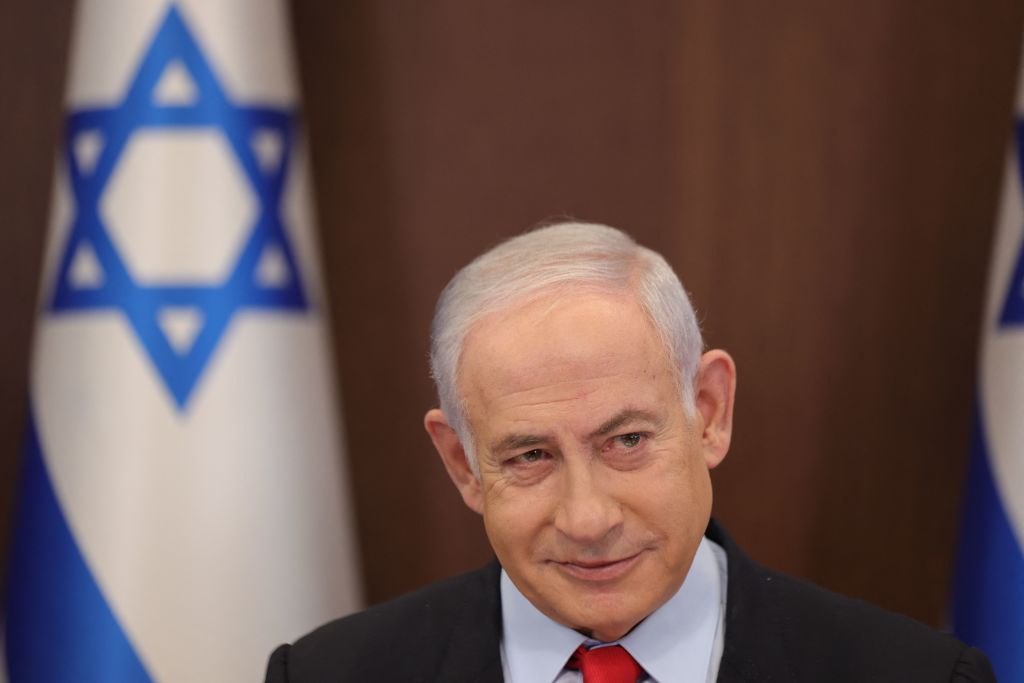
When Senate Majority Leader Chuck Schumer took to the Senate floor to call for Israelis to return to the polls to elect a new government, he articulated a position that many within and beyond Israel share: that Israeli Prime Minister Benjamin Netanyahu has put his political survival ahead of the country’s interests and that, amid a military campaign in Gaza where more than 30,000 Palestinians have been killed and some 134 Israelis remain hostage, perhaps his far-right coalition’s time in power has run its course.
Netanyahu’s dwindling popularity at home (where recent polls show him trailing his top rival, the retired army general Benny Gantz) and abroad has become increasingly apparent as Israel’s war in Gaza grinds on. Nearly half a year into its retaliatory war to root out Hamas from the Strip in the aftermath of the group’s Oct. 7 attack, the country appears no closer to meeting its desired endgame—one that the government says can only be achieved by launching a contentious offensive on Gaza’s southernmost and densely-populated city of Rafah. Meanwhile, the humanitarian catastrophe unfolding in Gaza continues to spiral as global calls for Israel to allow greater flows of aid into the Strip go unheeded.
Read More: U.S. Patience With Netanyahu Is Running Out
It’s then perhaps little wonder that Netanyahu has become widely regarded as a key obstacle to peace. Indeed, since returning to office in 2022 after a brief stint in opposition, Netanyahu has largely pursued policies aimed at preserving his power—most notably his government’s contentious judicial overhaul, which triggered consecutive months of mass protests. His popularity wasn’t great then, and it plummeted even further after Oct. 7; a majority of Israelis have blamed him for a failure to prevent the attack. Many now favor early elections (the next one isn’t due until late 2026), which would likely result in Netanyahu's ejection of power. While this would have a profound impact on Israel’s political landscape, which Netanyahu and his ruling Likud Party have dominated for the best part of two decades, expert observers warn that it won’t necessarily be a panacea.
This is particularly evident when it comes to managing the war, the responsibility for which has fallen to the country’s wartime unity government, made up of Netanyahu and other opposition figures, including Gantz. If elections in Israel were held today, Gantz’s centrist National Unity party would be in pole position to form the next government. But a Gantz administration wouldn’t necessarily bring a new approach to the war. On Gaza, “there isn’t much difference between Netanyahu and Gantz,” says Mairav Zonszein, a Senior Israel Analyst at the International Crisis Group, noting that both men have voiced their support for the Rafah incursion. Nor is there much daylight between them and Israeli public opinion, a majority of which continue to oppose a political agreement to end the war, according to a recent poll. (The same survey found that a majority also consider the prospects of Israel achieving an “absolute victory” to be unlikely.)
“Israelis who have been polled have supported the war effort,” Zonszein says. “There hasn’t been any pushback to the way Gaza has been treated in the war. And so certainly, I don’t think Gantz would change it on that level.”
Where Gantz could introduce change, however, would be in his dealings with the Americans. Unlike Netanyahu, who has openly sparred with President Biden over his government’s handling of the war, Gantz “would be much more cooperative and much less combative,” Zonszein says.“He would come at it from a much more kind of military perspective, which is that we need the U.S., we can’t jeopardize their supplying of weapons and aid.” He is also more likely to prioritize securing a deal to free the Israeli hostages who remain in Gaza.
Read More: What Israelis Think of the War With Hamas
When it comes to how Israel’s relationship with the Palestinians and the prospects of a two-state solution would fare under new leadership, fundamental change seems unlikely. Even before Oct. 7, Israeli politics appeared largely apathetic to the Palestinian question, preferring to manage the conflict rather than solve it outright. Netanyahu has proudly touted his role in preventing the creation of a Palestinian state, but his rivals also did little to address the conflict when given the chance. Indeed, during the short-lived “change government” of Naftali Bennett and Yair Lapid in 2021-2022, Israeli settlements in the occupied West Bank continued to expand. It was during this same period that Gantz, then serving as the country’s defense minister, notably outlawed six Palestinian rights groups in a move that critics dubbed a blatant attempt to prevent the documentation of abuses in the occupied Palestinian territories.
While Gantz hasn’t voiced as much reluctance toward a two-state solution as Netanyahu, he hasn’t offered much public support for it either. Even before Oct. 7, he refrained from calling for a two-state solution publicly, opting to speak of a “two entities” instead. But he has also demonstrated himself to be more open to dialogue with Palestinian leaders than Netanyahu or his allies, even going so far as to invite Palestinian Authority President Mahmoud Abbas for a rare meeting in his home when he was defense minister, during which they reportedly discussed, among other things, creating a “political horizon” for peace.

But even if Gantz were to support a two-state solution, it’s seemingly unlikely that he would press for one in the current context, according to Nimrod Novik, a fellow at the Israel Policy Forum and a former senior adviser to ex-Israeli Prime Minister Shimon Peres. “You’re not going to have a bunch of peaceniks who, the morning after [the election], will turn to [Abbas] and say, ‘Let’s sit down and talk peace,’” he says. “That’s not in the cards—not in terms of the public mood in the country, not in terms of the assessments of public mood among Palestinians … Alternative leadership will change course substantially, but not to the point of altering the course of history overnight.”
Still, Novik says that a full return to the pre-war status quo is similarly unlikely, noting that many Israeli leaders will have internalized several lessons from Oct. 7, chief among them that Israelis “have to change course from conflict management to conflict resolution, however long and arduous the course.” In doing so, he says, a new Israeli government might reconsider “the same reckless drive for settlement expansion” and pursue more popular policies such as normalizing relations with Saudi Arabia.
“This concept of regional integration and Saudi normalization is the most popular theme among the Israeli public,” Novik says. “What Israelis are not aware of are the two prerequisites—that you have to change policy on the Palestinian Authority and you have to offer a political horizon.”
Would Gantz be able to make that case? While Novik believes that Gantz supports a two-state solution in principle, he adds: “What we do not know is what we never know about a leader before he is in office, and that is: does he have the power of conviction to make it happen?”
In any event, prematurely forcing Netanyahu out won’t be an easy feat. New elections are not legally required in Israel until October 2026. While term limits certainly haven’t stopped the country from holding early elections before (see: its five consecutive elections between 2019 and 2022), there would need to be one of several triggers to force one—among them the collapse of Netanyahu’s current ruling coalition, a successful no-confidence motion in the Knesset, or mass civil protests of the likes seen last year.
Despite growing calls for new elections, Zonszein says the Israeli public is unlikely to demand one until a hostage deal is reached. “Israelis are now hostage to the hostage situation,” she says. “They’re not able to really function properly on other efforts until that’s solved, so it’s hard for them to focus on the election specifically when you have this [crisis] ongoing, which Netanyahu is clearly playing very well.”
More Must-Reads from TIME
- Cybersecurity Experts Are Sounding the Alarm on DOGE
- Meet the 2025 Women of the Year
- The Harsh Truth About Disability Inclusion
- Why Do More Young Adults Have Cancer?
- Colman Domingo Leads With Radical Love
- How to Get Better at Doing Things Alone
- Michelle Zauner Stares Down the Darkness
Write to Yasmeen Serhan at yasmeen.serhan@time.com